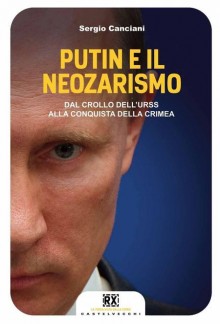A book by journalist Sergio Canciani, in which he contemplates the future of the Russian Federation through the history of the former “evil empire,” was published in Italy.
The book is a peculiar mix of analysis, historical references, and personal observations of the journalist. During his work in Russia the Italian journalist, who led the RAI headquarters in Moscow for 13 years, already published his second book, in which he describes in detail social and geopolitical processes of Eastern Europe. The name is as telling as it can be: Putin and Neotsarism. From the Collapse of the USSR to Conquering Crimea. This book is a logical continuation of Canciani’s first work, The Russian Empire. Neotsarism during Putin’s Reign: a Journey to the Soviet Empire through Corruption, Nostalgia, and Illusory Democracy, which was published in 2012. While in the first book the author focuses on Russian society and talks about the sharp contrast between lives of the oligarchic class and ordinary Russians, the unnatural flourishing of corruption, and the critical level of any democratic freedoms, the second one is about how it all ended and why other nations have to suffer because of the Russian World’s paranoia.
“The annexation of Crimea is the culmination of the political strategy the Kremlin has been working on for over 10 years: to regain Russia’s leading role on the international arena. The trajectory of the former ‘evil empire’ and huge antagonisms of the Eurasian federation can be only understood through its history. Putin, a former KGB agent, who is considered to be one of the world’s most influential people today, plays his cards on the southern border. But the problem overspills the boundaries of the former USSR and spreads to Europe and America like a cyclone,” the author writes. He openly calls Putin “tsar Vladimir,” comparing him to his predecessors.
The journalist describes the collapse of the Soviet Union, which became the greatest tragedy for Russia, his impressions from the Orange Revolution, and of course, the Revolution of Dignity.
Canciani manages to describe in detail the specifics of all Russia’s political games of the past decades in just 200 pages. The author deliberately uses Russian words in the text: czar (tsar), vozhd (leader), strogo sekretno (top secret), etc.
The author thinks that the most important puppet in Putin’s hands is the smallest matryoshka, but it made of the hardest wood: Russia’s middle class. Putin has only two paths: to suppress or to promote liberal reforms. Now he starts to clearly understand that it is impossible to stop the powerful wave of young oppositionists who use Internet, travel, and speak English.
A lot of books have appeared in Europe lately, the authors of which are trying to analyze the situation in Ukraine and Russia. However, not all of them chose the right angle of research of this complicated topic. After numerous presentations, Cancini’s book became popular in Italy, since the author explains how we ended up in the current situation and why history is a powerful tool in the hands of great nations.








